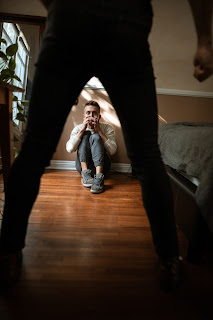The Need for Order Begets Disorder
I have been in a unique position to observe a family member struggle with emotional trauma. While I am not at liberty to speak for this person, I have been trying my hand at deep empathy, envisioning the mental anguish that they might be facing. I have also been trying to pay attention to the issues and circumstances that trigger their terrible moments. It's tough to watch, but I believe I have made some progress in understanding. I might be completely off-base, but here's what I have discerned.
Have you ever watched someone flip-out on someone else and to you it seemed like overkill? Perhaps this reaction from this person seemed imbalanced when compared to the thing that caused their reaction. Well, this is the very thing I have been careful to observe with my loved one.
As a premise, let me say that we all -- regardless of mental or emotional disorder -- can and do have moments of temporary break down and hyper-reactivity. These are human responses to stress and tension. We can all be as rubber-bands snapping when stretched too thin. Still, for someone who has experienced trauma, I believe the triggers are quicker and more frequent exactly because of their trauma.
When a person is severely treated and trauma is induced, this is a moment of disordering. While we can say that their condition is a mental or emotional disorder, such phrasing has lost meaning in today's nomenclature. We need to look at the very incident(s) of trauma, because that is when order was made into disorder. A person's trauma is an unraveling of security, safety, peace, balance, and psycho-social order. The response is to re-order things. I suspect, though I have not yet evaluated the psychological sources on this, that conditions like obsessive-compulsion, hyper-spending, and extreme vitriol against people who threaten an emotionally-ill person's peace, are responses to disorder. In other words, these are responses to the very trauma that led to their disorder, projected to alternate sources. So, they express responses to establish or re-establish order. Sadly, this may mean over-reaction or hyper-reaction, and this may jeopardize other people's order. In short, the need for order begets disorder.
In my last blog article, I noted how family members of mentally ill folks are more likely to develop mental illnesses themselves. It's because when an emotionally ill person seeks extreme measures to retain or regain order, they may inadvertently pass trauma to others in their sphere. My loved one can be overly demeaning to their loved ones when their loved ones fail to function according to their sense of order. Because of this, they internalize and personalize the actions or inactions of their friends and family, and grow suspect of these people and behaviors. They might then degrade their loved ones' characters, over-react with greater frequency, feel as if they are failures in dealing with others, develop hyper-depressed behavior, become suicidal, or lose affection for others. The risk is transmitting trauma to others. It needs to be dealt with for the health of all.
Now, this doesn't mean that the ill person should isolate themselves in the form of flight and complete withdrawal; however, it does demonstrate that mental and emotional illness is transmittable like the flu or a cold. Coping activities that function like momentary quarantines may be necessary. A healing time to reflect on their treatment of those they love is needed, because when trauma is perpetuated, it will also return from the newly infected and re-infect the original vector. It becomes cyclical.
In the end, the need to gain order might actually disorder others, but this should not be a reason to stigmatize someone's illness or toxic tendencies. It should also not be used as rationale by the disordered to stagnate in their negative responses or posit a sense of worthlessness. That's a negative coping mechanism that actually harms their disposition and retains the severity of the illness.
These are my observations.



Comments
Post a Comment